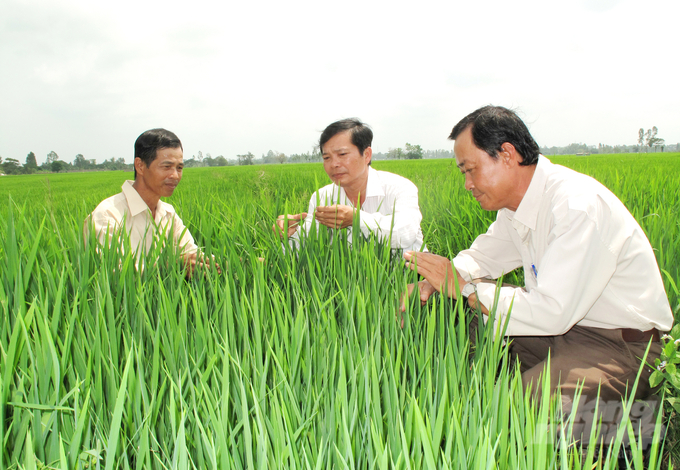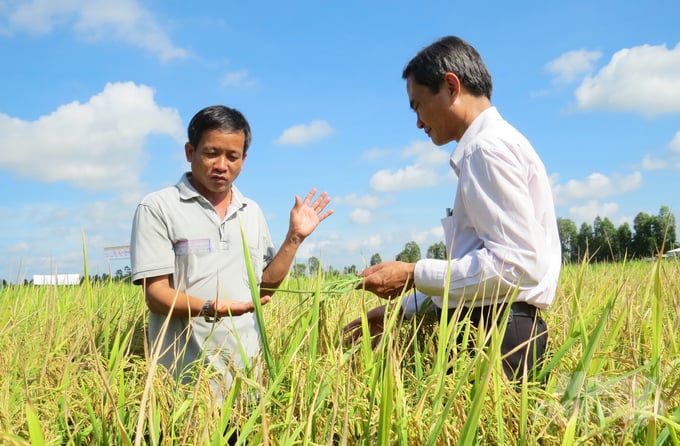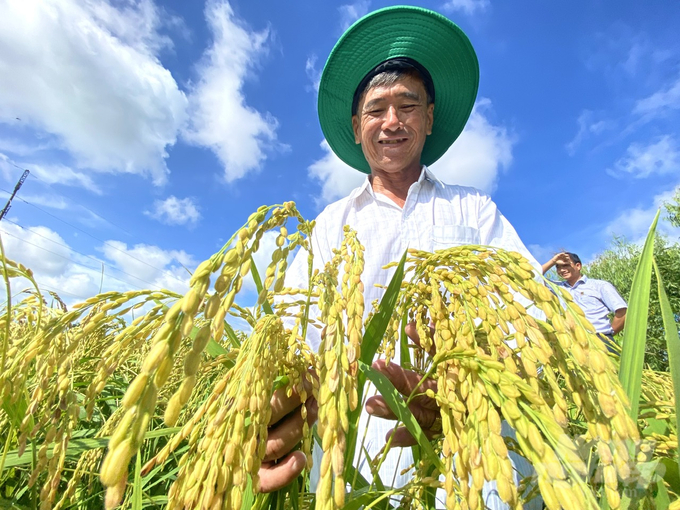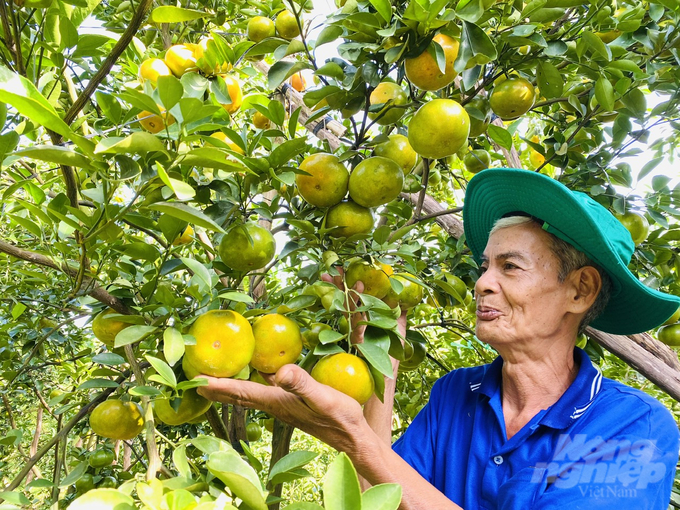May 22, 2025 | 13:59 GMT +7
May 22, 2025 | 13:59 GMT +7
Hotline: 0913.378.918
May 22, 2025 | 13:59 GMT +7
Hotline: 0913.378.918

Community agricultural extension teams in Dong Thap play an important role in transmitting information, providing new technology knowledge and production experience to farmers. Photo: Le Hoang Vu.
At present, the District Agricultural Service Centers in Dong Thap province have consolidated the Agricultural Extension Stations, Plant Protection Stations, Veterinary Stations, and Aquaculture Stations at the district level. These centers are responsible for agricultural extension responsibilities. There are no agricultural extension forces or grassroots extension personnel at the commune level. The implementation of community agricultural extension teams has fostered innovation in local agricultural extension work, serving as a constructive "nucleus" for the transfer of technical, scientific, and technological advancements in agricultural production and the connection between production and product consumption.
Dong Thap province has established 117 community agricultural extension teams with 1,358 members following the two-year implementation of the Project "Improving the Effectiveness of Agricultural Extension Activities based on Consolidating the Model of Community Agricultural Extension Teams."
The community agricultural extension teams comprise the District Agricultural Service Center, commune agricultural officers, and commune People's Committee leaders. The Vice Chairman of the Commune People's Committee is responsible for leading approximately 85% of the community agricultural extension teams.
Representatives from cooperatives, social organizations, farmer associations, cooperative groups, political organizations, and exemplary producers in the region comprise the coordinating members. Representatives from political organizations are invited to participate in 100% of the community agricultural extension teams, while 98% of the teams invite representatives from HTX, THT, farmer associations, and exemplary farmers.

Up to now, Dong Thap province has had 117 community agricultural extension groups established with 1,358 members. Photo: Le Hoang Vu.
The advantages of the community agricultural extension teams' initiatives have been evident to Dong Thap producers for an extended period. Farmers have been able to more easily implement scientific and technical advancements in production as a result of the teams' flexibility and approachability. This not only enhances the productivity of crops and livestock but also decreases production costs and boosts farmers' incomes.
Mr. Le Van Minh, a farmer in My Hiep commune, Cao Lanh district, who cultivates 1.8 hectares of rice, expressed his satisfaction with the following: "In the past, farmers frequently encountered challenges in acquiring market information and implementing new technical innovations in rice production." After the community agricultural extension team was established, we have acquired the knowledge necessary to cultivate rice using advanced technical methods, including '3 reductions 3 increases', '1 must 5 reductions', alternate soaking and drying irrigation, and the application of organic products. Consequently, productivity has increased significantly and costs have decreased compared to previous levels.
In addition to providing technical assistance, the agricultural extension team assists producers in establishing connections with product consumption markets, thereby allowing them to be more proactive in their production and sales. Farmers are no longer concerned with the sale of their products, as there are purchasing units that guarantee a consistent output.
As per Mr. Tran Van Nhan, Deputy Director of the Center for Agricultural Services, Irrigation Management, and Rural Clean Water in Dong Thap province, community agricultural extension teams have demonstrated exceptional efficacy in Dong Thap province. By providing support and guidance from the provincial agricultural sector, these teams have established a critical link between scientists and producers, thereby enhancing the quality and productivity of agricultural products.

For many years now, farmers in Dong Thap have clearly seen the benefits from the activities of community agricultural extension groups. Photo: Le Hoang Vu.
In Dong Thap's agricultural development plan, establishing and developing community agricultural extension teams are essential strategies. According to Mr. Nhan, the provincial agricultural sector regards the establishment of these teams as a critical solution for delivering scientific and technical advancements directly to producers. These teams not only disseminate knowledge but also act as a conduit to assist producers in gaining access to government support policies and other organizations.
Additionally, Mr. Nhan underscored the significance of improving the capabilities of the extension team members. The center conducts training courses regularly to enhance the knowledge and skills of agricultural extension officers, guaranteeing that they can provide effective support to farmers. For instance, three agricultural production models pertain to jackfruit, mango, and rice. Also, the center partners with companies to facilitate the transmission of technology related to drones, cluster rice sowing devices, and product consumption. Currently, two prototype community agricultural extension teams have satisfied all nine criteria associated with establishing new rural communes.
Nevertheless, the community agricultural extension teams in Dong Thap continue to encounter numerous obstacles. The most significant challenge is the system's risk of weakening and lacking cohesion due to the absence of commune-level extension officers.

The activities of the community agricultural extension team in Dong Thap province have proven to be effective in helping farmers improve productivity and product quality. Photo: Le Hoang Vu.
Community agricultural extension teams have been established; however, they are primarily responsible for coordination tasks due to a lack of legal status, operational funding, and facility investment. Establishing internal expenditure regulations based on the founding decisions has not been implemented, as these teams labor part-time and lack specific funding.
The Center for Agricultural Services, Irrigation Management, and Rural Clean Water in Dong Thap province addresses these challenges by implementing various solutions, including requesting enterprises' and social organizations' financial and resource support. Furthermore, the center is enhancing its communication initiatives to increase public awareness of the function of community agricultural extension teams.
Translated by Linh Linh

(VAN) The draft amendment to the Circular on rice export trading stipulates a periodic reporting regime for rice exporting enterprises.

(VAN) Dong Thap farmers attained an average profit margin of 64% during the summer-autumn 2024 crop (first season), while An Giang and Kien Giang farmers followed with 56% and 54%, respectively.

(VAN) As a doctoral student doing research on renewable energy and electrification at Harvard University, the author shares his musings on electricity, nature, and countryside memories.

(VAN) The decree on Extended Producer Responsibility (EPR) ensures transparent management and disbursement of support funds, avoiding the creation of a “give-and-take” mechanism.

(VAN) Hue City rigorously enforces regulations regarding marine fishing and resource exploitation, with a particular emphasis on the monitoring of fishing vessels to prevent illegal, unreported, and unregulated (IUU) fishing.

(VAN) Hanoi People's Committee has issued a plan on reducing greenhouse gas emissions in the waste management sector with 2030 vision.

(VAN) Vietnam's draft amendment to Decree No. 156 proposes a mechanism for medicinal herb farming under forest canopies, linking economic development to population retention and the sustainable protection and development of forests.